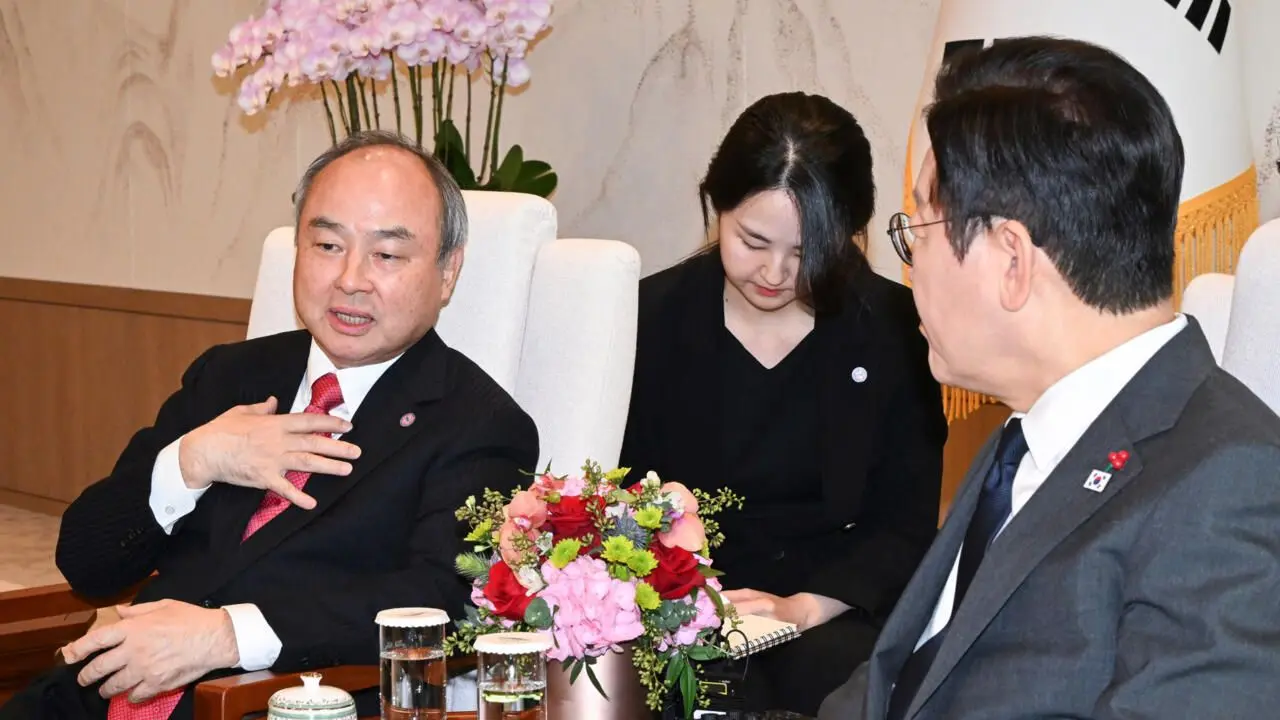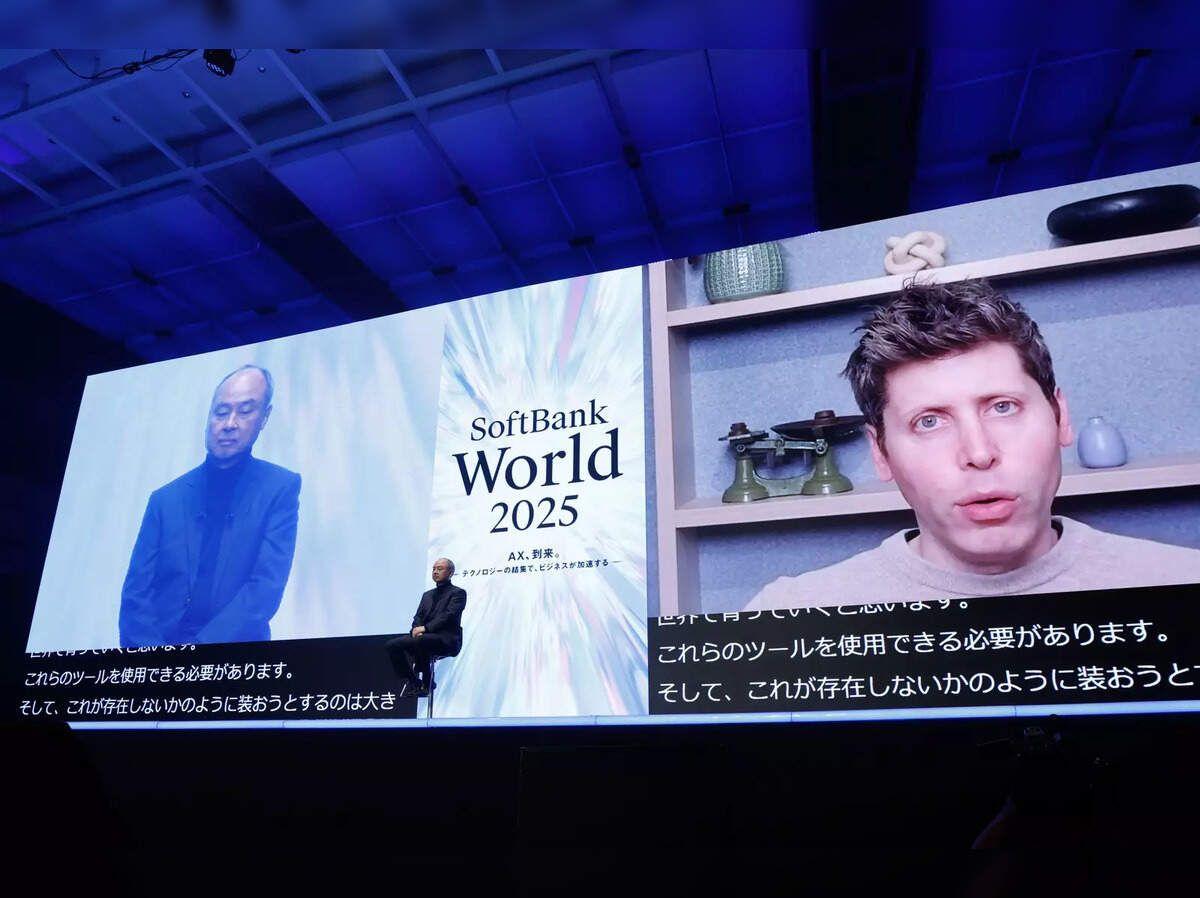SoftBank CEO and OpenAI's Sam Altman Discuss AI's Future: No Threat to Humanity, but Revolutionary Impact on Industries
2 Sources
2 Sources
[1]
Don't Worry, AI Won't Eat You -- It Doesn't Even Like Protein: SoftBank CEO - Decrypt
Software might well eat the world, but artificial intelligence won't eat humans. At least, that's what Softbank CEO Masayoshi Son believes. "People think if [AI] has emotions, it's a disaster, it's demonish, it's a bad thing because they're going to fight and kill you -- destroy you," Son said Monday during a panel discussion with OpenAI CEO Sam Altman in Tokyo. "I would say if their source of energy was protein, then it's dangerous." Luckily for us, however, "their source of energy is not protein, so they don't have to eat us," Son noted. Son and OpenAI's CEO had a wide-ranging discussion about the future and the impact of AI in the world, touching on a number of things that are giving us protein-beings agita, beyond the fear that AI will devour us. Lots of critics, for instance, believe that the real existential threat to humans is economic -- that within a decade or so, AI will wholly replace us in the workforce. Altman brushed away those concerns: "People worry a lot and say, 'What is this going to mean for all of the jobs?' And then we always find new things to do," he said, comparing today's workers to how ancient people might view modern office jobs. "If you think about many of our jobs in this room today, if you were a person 500 years ago, that person would look at what we're doing and say that's not really work," Altman added. SoftBank was among the companies investing in Project Stargate -- a $500 billion initiative announced last month that will fund faster deployment of AI in the US. The project plans to allocate 1,000 engineers to develop AI agents that could function like employees. Altman's vision, which he outlined in Tokyo, went further -- he described how AI agents would access to company systems, knowledge bases, and a deep understanding of business operations. He even posited the idea of "virtual companies" that would work exclusively with AI agents instead of humans. Companies that fail to integrate these technologies, he warned, would face a disadvantage. He explained how the adoption of new tech is always an advantage. "During the Bronze Age, they were able to forge blades and cast handles together. What that meant is you could swing rather than just jab with a wooden handle that would break. That changed Europe," Altman explained. "Companies that don't integrate AI will have a hard time competing." The stakes are high, and not everyone is convinced they are serious about risking so much. Elon Musk, for instance, a disgruntled co-founder of OpenAI who left the board and has been beefing with Altman, questioned whether SoftBank had enough money for Stargate Son fired back at the new head of DOGE: "I will tell you (Elon), we will make it happen. We are not the bank -- but we are SoftBank." Son, who said he used ChatGPT daily, said that while competitors like DeepSeek were making headlines, OpenAI remained "leaps ahead." Altman agreed: "It is hard to really feel the exponential when you're living on it, because you can adapt so quickly, but we clearly are on a very steep one." Altman and Son discussed the idea of "infinite long-term memory" capabilities -- AI systems that could understand a person's entire life or company history. "That'll be a huge step forward," Altman said, predicting this technology would arrive within the next couple of years. The executives also believe humanoid robots would become commonplace in the future. "I think in a few years we can have really great humanoid robots and lots of other kinds of robots too, and that will also change the world," Altman said. Hopefully, they won't develop a taste for protein either.
[2]
'AI Doesn't Need Protein So it Won't Eat Us,' says SoftBank CEO
"AI will understand human happiness and try to make humans happy," Son said. In a conversation with OpenAI chief Sam Altman in Tokyo, SoftBank CEO Masayoshi Son said that AI, even as it develops the ability to understand emotions, will not pose a threat to humanity. Son said that if AI's source of energy were protein, it would be dangerous. However, he clarified, "Their source of energy is not protein, so they don't have to eat us." Hence, there is no need for AI to harm humans for sustenance. "AI will understand human happiness and try to make humans happy," Son added, dismissing fears of a dystopian future in which AI harms people. "In the next 10 years, it will gradually start to have at least an understanding of people's emotions, and then gradually, it will start to have emotions by itself. And it's a good thing to protect humans," he said, reacting to people's belief that AI developing emotions would be "a disaster". Altman said that AI's ability to understand human emotions will likely spark a philosophical debate. According to Son, as AI becomes smarter, it will be able to understand human emotions and be nicer to us if we are nice to it. "Like we are nicer to friends, they will become nicer to humans. That's my belief," he said. Moreover, Son expressed optimism about AI's potential to revolutionise sectors like healthcare and education. He said that AI could one day cure or treat all diseases, offering hope for great healthcare for everyone on Earth. "This is one of the areas I am most excited about," he said, adding that AI could play an important role in easing the burden on healthcare professionals. SoftBank Group recently announced a partnership to develop and market an enterprise AI solution called Cristal intelligence. "Cristal intelligence will securely integrate the systems and data of individual enterprises in a way that is customised specifically for each company," an announcement from SoftBank stated. SoftBank also revealed that they will spend $3 billion annually to deploy OpenAI's solutions across all the companies in their group, which includes the chip design giant Arm.
Share
Share
Copy Link
SoftBank CEO Masayoshi Son and OpenAI CEO Sam Altman discuss AI's future, dismissing fears of AI harming humans and highlighting its potential to revolutionize various sectors, including the workforce and healthcare.

AI Won't Eat Humans, Says SoftBank CEO
In a recent panel discussion in Tokyo, SoftBank CEO Masayoshi Son and OpenAI CEO Sam Altman addressed concerns about artificial intelligence (AI) and its potential impact on humanity. Son humorously dismissed fears of AI harming humans, stating, "Their source of energy is not protein, so they don't have to eat us"
1
. This lighthearted approach set the tone for a wide-ranging conversation about AI's future and its implications for various sectors.AI and the Workforce
One of the primary concerns addressed was the fear of AI replacing human jobs. Altman compared today's workforce concerns to how ancient people might view modern office jobs, suggesting that society always finds new roles and adapts
1
. He emphasized the importance of integrating AI technologies, warning that companies failing to do so may face competitive disadvantages.Altman also introduced the concept of "virtual companies" that would work exclusively with AI agents instead of humans. He described how AI agents could access company systems, knowledge bases, and develop a deep understanding of business operations
1
.Project Stargate and AI Investment
The discussion touched on Project Stargate, a $500 billion initiative announced last month to accelerate AI deployment in the US. SoftBank is among the investors in this project, which aims to allocate 1,000 engineers to develop AI agents that could function like employees
1
.Son reaffirmed SoftBank's commitment to AI development, announcing plans to spend $3 billion annually to deploy OpenAI's solutions across all companies in their group, including chip design giant Arm
2
. Additionally, SoftBank recently announced a partnership to develop and market an enterprise AI solution called Cristal intelligence2
.AI's Emotional Intelligence and Impact on Healthcare
Son expressed optimism about AI's potential to understand and respond to human emotions. He stated, "AI will understand human happiness and try to make humans happy," dismissing fears of a dystopian future
2
. Son believes that as AI becomes smarter, it will be able to understand human emotions and reciprocate kindness.The SoftBank CEO also highlighted AI's potential to revolutionize healthcare and education. He envisioned a future where AI could cure or treat all diseases, offering hope for improved healthcare accessibility worldwide
2
.Related Stories
Technological Advancements and Future Predictions
Altman and Son discussed the concept of "infinite long-term memory" capabilities in AI systems, which could understand a person's entire life or company history. Altman predicted this technology would arrive within the next couple of years
1
.The executives also forecasted the widespread adoption of humanoid robots in the near future. "I think in a few years we can have really great humanoid robots and lots of other kinds of robots too, and that will also change the world," Altman said
1
.Competitive Landscape and Industry Leadership
While acknowledging competitors like DeepSeek, Son maintained that OpenAI remained "leaps ahead" in the AI field. Altman agreed, noting the rapid pace of advancement: "It is hard to really feel the exponential when you're living on it, because you can adapt so quickly, but we clearly are on a very steep one"
1
.As AI continues to evolve and integrate into various aspects of society, the insights shared by Son and Altman provide a glimpse into a future where AI coexists with humanity, potentially enhancing rather than threatening our existence.
References
Summarized by
Navi
Related Stories
SoftBank's Masayoshi Son Predicts AI Revolution: Superintelligence Within a Decade
03 Oct 2024•Technology

SoftBank's Masayoshi Son says ASI could be 10,000 times smarter, making humans 'like fish'
05 Dec 2025•Technology

Masayoshi Son and Sam Altman Predict Exponential Growth in AI Demand and Infrastructure
16 Jul 2025•Technology

Recent Highlights
1
ByteDance's Seedance 2.0 AI video generator triggers copyright infringement battle with Hollywood
Policy and Regulation

2
Demis Hassabis predicts AGI in 5-8 years, sees new golden era transforming medicine and science
Technology

3
Nvidia and Meta forge massive chip deal as computing power demands reshape AI infrastructure
Technology





